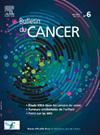Actions de pharmacie clinique dans l’hormonothérapie adjuvante des cancers du sein précoces : étude qualitative des besoins
IF 0.8
4区 医学
Q4 ONCOLOGY
引用次数: 0
Abstract
Introduction
L’hormonothérapie orale adjuvante du cancer du sein précoce, malgré son importance dans la survie et la prévention des récidives, ne rentre généralement pas dans les programmes de pharmacie clinique des anticancéreux oraux, alors que des problématiques d’adhésion thérapeutique ont été identifiées. L’objectif de notre étude était d’explorer la perception des professionnels de santé concernant la prescription et la dispensation de cette hormonothérapie, afin d’identifier les risques pour ces patientes et de déterminer les actions de pharmacie clinique pouvant répondre à ces risques.
Méthode
Une étude prospective qualitative a été menée en réalisant des entretiens semi-directifs auprès de médecins d’un centre hospitalier universitaire impliqués dans la prise en charge de ces patientes, et auprès de pharmaciens et préparateurs officinaux impliqués dans leur suivi ambulatoire. Les entretiens ont été analysés par une approche inductive.
Résultats
Dix entretiens ont été menés. L’analyse des entretiens réalisés auprès des médecins révèle que le défaut d’adhésion thérapeutique, fréquemment lié aux effets indésirables, reste une préoccupation majeure. Pour la majorité des professionnels interrogés, la réalisation d’un entretien pharmaceutique ciblé pourrait limiter ce défaut d’adhésion. L’ensemble des professionnels juge qu’un lien ville-hôpital est essentiel mais des freins persistent, comme le manque de temps et la multitude d’interlocuteurs impliqués.
Discussion
L’instauration de l’hormonothérapie pourrait s’accompagner d’une prise en charge pluriprofessionnelle incluant des activités de pharmacie clinique auprès des patientes identifiées à risque d’effets indésirables ou de défaut d’adhésion. Une hospitalisation de jour, valorisée par le dispositif de gradation des soins, pourrait répondre à ce besoin.
Introduction
Oral adjuvant hormone therapy for early breast cancer, despite its proven importance in terms of survival and prevention of recurrence, does not fall within the scope of clinical pharmacy programs set up for oral anticancer drugs, even though issues of therapeutic adherence have been clearly identified. The aim of our study was to explore the perception of healthcare professionals regarding the prescription and dispensing of this hormone therapy, in order to identify the risks for these patients and determine the clinical pharmacy actions that could address these risks.
Method
A prospective qualitative study was carried out by means of semi-structured interviews with doctors at a university hospital involved in the care of these patients, and with pharmacists and technicians involved in their outpatient follow-up. The interviews were analyzed using an inductive approach.
Results
Ten interviews were conducted. Analysis of the interviews with doctors revealed that poor adherence to treatment, frequently linked to adverse effects, remains a major concern. For the majority of professionals interviewed, a pharmaceutical interview could limit this lack of adherence. All professionals consider that a city-hospital link is essential, but obstacles persist, such as lack of time and the multitude of interlocutors involved.
Discussion
The introduction of hormone therapy could be accompanied by a multi-professional approach, including clinical pharmacy activities for patients identified as being at risk of adverse effects or non-compliance. Day hospitalization, financed by the gradation of care system, could meet this need.
早期乳腺癌激素辅助治疗的临床药学作用:需求的定性研究
早期乳腺癌的口服辅助激素治疗,尽管在生存和预防复发方面被证明是重要的,但它不属于口服抗癌药物的临床药学项目的范围,即使治疗依从性的问题已经明确确定。本研究的目的是探讨医疗保健专业人员对这种激素疗法的处方和分配的看法,以确定这些患者的风险,并确定可以解决这些风险的临床药学行动。方法:采用半结构化访谈的方法,对一所大学医院参与治疗这些患者的医生以及参与门诊随访的药剂师和技术人员进行前瞻性定性研究。使用归纳方法对访谈进行分析。结果:共进行了10次访谈。对医生访谈的分析显示,治疗依从性差,往往与不良反应有关,仍然是一个主要问题。对于大多数接受采访的专业人士来说,药物访谈可以限制这种缺乏依从性。所有专业人员都认为,城市与医院之间的联系是必不可少的,但障碍仍然存在,例如缺乏时间和涉及的对话者众多。讨论:激素治疗的引入可以伴随着多专业的方法,包括对有不良反应风险或不依从性的患者的临床药学活动。由分级护理系统供资的日间住院可以满足这一需求。
本文章由计算机程序翻译,如有差异,请以英文原文为准。
求助全文
约1分钟内获得全文
求助全文
来源期刊

Bulletin Du Cancer
医学-肿瘤学
CiteScore
1.90
自引率
16.70%
发文量
224
审稿时长
37 days
期刊介绍:
Without doubt, the ''Bulletin du Cancer'' is the French language publication of reference in the field of cancerology. Official organ of the French Society of Cancer, this journal covers all the information available, whether in the form of original articles or review articles, but also clinical cases and letters to the editor, including various disciplines as onco-hematology, solids tumors, medical oncology, pharmacology, epidemiology, biology as well as fundamental research in cancerology. The journal proposes a clinical and therapeutic approach of high scientific standard and regular updates in knowledge are thus made possible. Articles can be submitted in French or English.
 求助内容:
求助内容: 应助结果提醒方式:
应助结果提醒方式:


